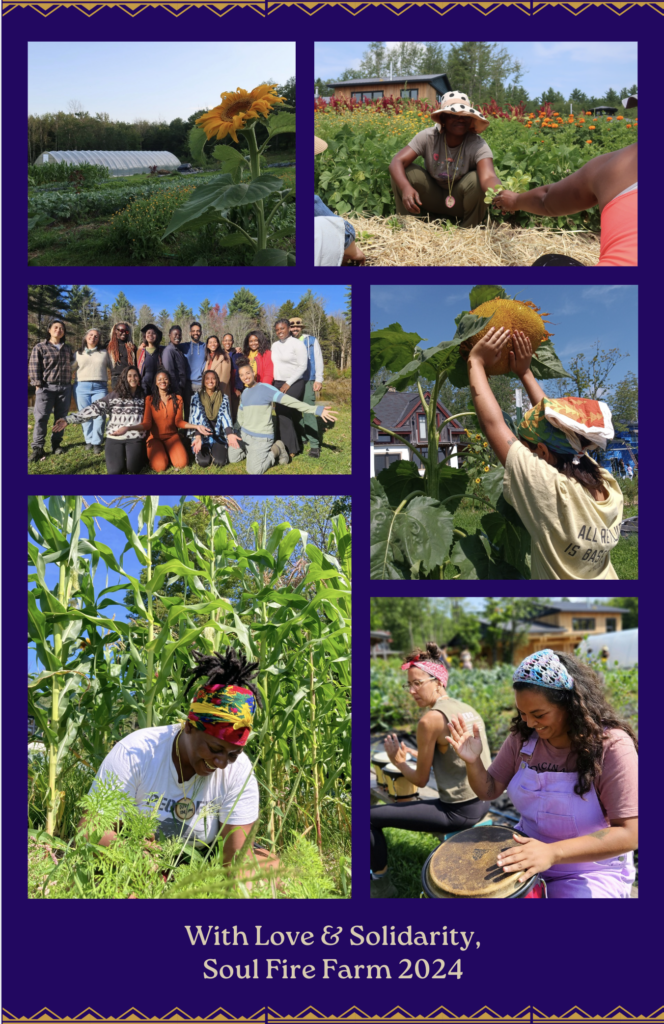
Ìrókò
The Iroko is a divine hardwood tree from the west coast of tropical Africa. Irokos don’t branch for the first several feet of the trunk, resembling an enduring arm reaching up from the earth with fingers spreading out towards the heavens. This sacred spirit, whose seeds have mechanisms for dormancy that allow them to wait in the soil until conditions are ideal for growth, inspires us towards resiliency. The kind of resilience that honors imaginative solutions, collaboration, and divine timing. Like the Iroko, our seeds once nestled in dense soil, have now pushed up towards sunlight.
This year we navigated climate catastrophe to meet our mission of delivering life giving food and medicine to people surviving food apartheid. We refined our systems for pest management and soil health to distribute 15,000 lbs of beautiful, healthy produce to local community members. This was a record high since the start of the pandemic. Though challenges continued to roll in like storm clouds heavy with rain, we remained adaptable and sought the wisdom of our experiences. Through numerous setbacks caused by supply and labor shortages in the trades, delays, and cost increases, we persevered to complete the program center – the new “HIVE” – with teaching kitchen, dining commons, library, children’s nook, and media studio. This new campus addition is beautifully framed with stone walls, stone planters, stairs, and ADA paved pathways around the new HIVE, hand-harvested from the land and hand built. This dignified and lovingly crafted space has already served as a hub for the rising generation of BIPOC land stewards to build toward their visions of the future. This year we even revived the Liberation on Land Youth Immersion where we hosted a three day, two night program for twelve BIPOC teens, prioritizing local youth. With three of the facilitators who graduated from the program in 2017 and returned in a leadership role, we devised strategies for making positive change in our communities, dyed fabric with flowers, learned how to stress less and love more, strung garlands of bright marigold blossoms, harvested berries, and danced in the rain. This year we also engaged with 84 farmers and land stewards at our 3D virtual and in person workshops, to share skills on topics including Agroforestry, Beekeeping, Natural Dyes, Mycology, Soil Health, Mountain Microorganisms, and nourishment with Cempasúchil (Marigold). We further reduced the barrier to participation in the fortifying programs on our campus by providing more than $1,500 in travel reimbursements to participants. Through each trial, 2024 has been a transformative year of adaptation and rebirth.
Our collective resilience radiated far beyond just our farm. Like a network of tree roots exchanging nutrients and information beneath our feet, we shared struggles and victories with our comrades. Our Braiding Seeds southeast gathering was framed around helping a new fellow rebuild her family farm after the land in South Carolina was destroyed by flooding in the summer. Fellows and alumni were joined by our partners from Fresh Future Farm to help complete building structures of the hog pen and hen run; install livestock wire around henhouse and duck pond, and soft wire for flooring and nesting boxes, and transplant greens & other seedlings. Our Braiding Seeds Fellowship now supports around 515 acres of farmland combined being stewarded across the Northeast and the Southeast. This year, we closely supported 5 fellows/alumni in the process of purchasing farmland with 3 having completed closing and 2 due to close in the near future. In total, this represents 240 acres now under their secure, long-term stewardship.
Our commitment to collective resilience extended to our broader community as well. In addition to Soul Fire in the City establishing 10 new gardens in Albany and Troy, for the first time we distributed perennial fruit-bearing shrubs to SFitC gardeners, raspberries, strawberries, elderberries and currants. We conducted two in-person workshops in neighborhoods accessible to SFitC gardeners centered around gardening skills, including strawberry jam making inspired by Naima Penniman’s beloved grandmother. In addition, we galvanized around community initiatives such as the Tractor Supply campaign which pushed back against the company’s recalling of DEI initiatives, a campaign stewarded by our friends at Rock Steady Farm. As well as the Rootwork Herbals campaign which brought together the Black Farmer Ecosystem to rally around harassment and anti-black racism of the land steward. Our efforts led to a successful fundraiser and even contributed to the judicial system holding accountable the neighbor responsible for harm.
There is no challenge that this beloved community can’t overcome. With each barrier that arises we are presented with an opportunity to draw closer to our mission, and to each other. During our last Fire Immersion, a friend of a participant, who is incarcerated, joined the spiritual bath via video. He tuned in to the water ritual where we poured rain water that we collected and heated, infused with sacred plants from the land and our intentions for personal and collective liberation. This moment of redemption and resistance encapsulated our visions for a world free of colonialism, militarized violence, capitalist greed, hatred of the perceived other, supremacy, and plunder of Mother Earth. With 407,629 people touched by our programming in 2024, we’re hopeful and inspired to continue onward until we all are free.
Briana, Brooke, Cheryl, Christina, Clara, Crysta, Danielle, Hana’, Hillary, Jonah, Leah, Maya, Naima, O’den, Ria, Shay, and Susuyu (Soul Fire Farm); Lulu and Sarah (Braiding Seeds)

